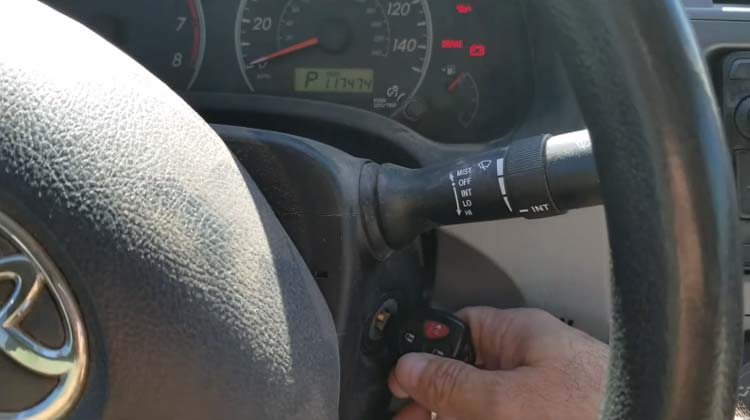There are a variety of reasons why your car might hesitate to start. In this discussion, I will discuss the most common causes of this issue and how to fix them. If you are having problems getting your car started, it is important to troubleshoot the problem as soon as possible. By taking care of the issue quickly, you can avoid expensive repairs down the road. So, what are some of the most common causes of a car that hesitates to start? Let’s take a look!
Cause of a Car Hesitates To Start: Depth Discussion
A car that hesitates when starting can be caused by a few different issues, including fuel supply problems, bad engine sensors, or ignition difficulties such as old spark plugs or ignition coils. Additionally, a weak starter motor or low battery voltage could also create these issues.
If your car isn’t starting, there could be any number of issues with the engine. But don’t worry, by eliminating some potential causes, you can get to the root of the problem quickly. In newer cars especially, computers monitor every sensor and store a trouble code if one fails. In order to avoid wasting time and money, use a code scanner to read the OBD trouble codes before taking any further actions.
Here are some reasons why your car may have difficulty starting up:
Fuel Delivery Issues:
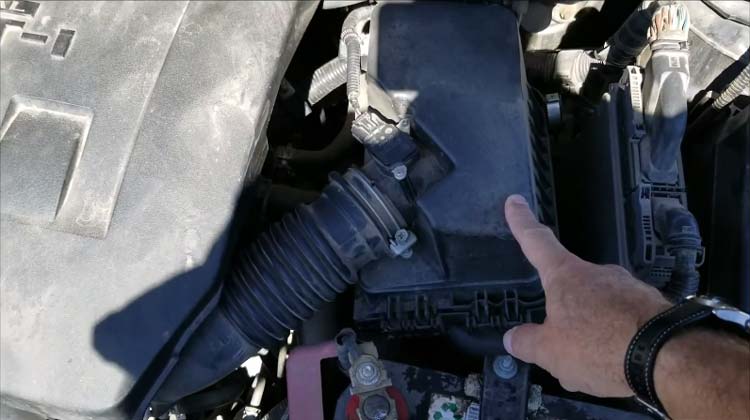
A car needs both air and fuel to run, and enough of each must reach the engine for it to start properly. If there is an issue with the vehicle’s fuel system, it might not be able to deliver the right amount of fuel to where it’s needed.
If you’ve narrowed down the problem to the fuel system, there are several potential issues, such as a clogged fuel filter, malfunctioning fuel injectors, or a faulty fuel pump resulting in low pressure. You’ll have to figure out which part is causing difficulty and replace it accordingly.
The engine requires more fuel to be injected into the cylinders during the startup phase than when it is running, so low fuel pressure can cause this problem.
Faulty Engine Sensor:
As earlier discussed, a failing engine sensor can cause the engine control module to inject too much or too little fuel into the car’s engine. This results in an overabundant or insufficient air-fuel mixture. Because there are many sensors in automobiles, it is important to check for error codes first.
A car that hesitates to start when the engine is warm or cold likely has a bad engine coolant temperature sensor. However, the MAF sensor or a bad camshaft position sensor could also be causing starting issues.
Faulty Battery Or Connection:
The car battery is responsible for providing the voltage needed to start the engine. When a battery starts to fail, it can’t provide enough voltage to get the engine started right away. Instead, it might take some time. The older the battery becomes, the fewer cranking amps it can provide. This is most prevalent when temperatures get colder.
If the battery is still functional, your problem might be with how it’s connected. If there’s any corrosion on the battery cables or posts, then the power needed to start the car won’t be able to flow through.
Make sure to regularly check the battery terminals and clean them if necessary – you can use a baking soda and water mixture. You should also have the health of the battery checked periodically, which most auto parts stores will do for free. Be sure to replace the battery as soon as it starts failing so that you don’t get stranded!
Faulty Spark Plugs:
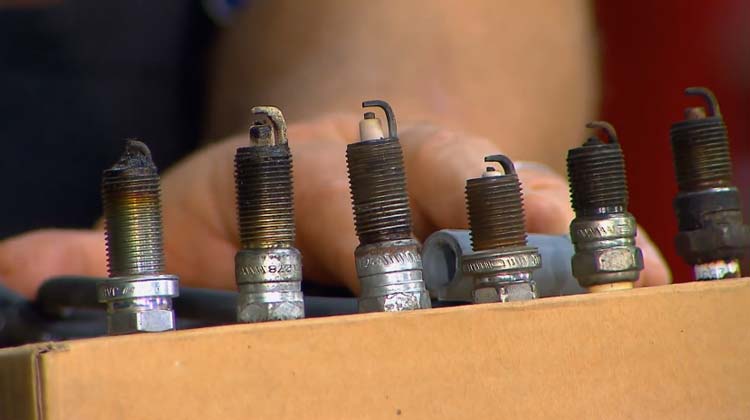
The ignition system is another thing you have to think about when starting a car, in addition to the charging and electrical side. As spark plugs start to fail, they make it harder to start the engine. Additionally, as the plugs get older, you might notice some performance issues like a rough idle or misfire.
If you stay on top of maintenance and regularly change your spark plugs, then this shouldn’t be an issue. However, if it’s been a while since you’ve changed them and your engine is having trouble starting, go ahead and take a look. They might need to be replaced.
When the ignition coils are sending power to the spark plugs and these are getting worse, it could cause a weak spark. This will make it difficult to start the car as well.
Clogged Air Filter:
A clogged air filter starves the engine of the air it needs to run. This is more common in older cars that haven’t had their filters changed in a while, but it can happen to newer cars too if they’re driven in dusty conditions often.
If you think this might be the issue, go ahead and check your air filter. If it’s black and caked with dirt, then it needs to be replaced. A new air filter is relatively inexpensive and easy to change – you can even do it yourself!
Dirty Oil:
If the oil in your car is old and dirty, it can make it harder to start. This is because the oil isn’t able to flow as easily and lubricate the engine parts when it’s dirty.
To avoid this problem, make sure you regularly change your oil according to the manufacturer’s recommendations. This will vary depending on the make and model of your car, but it’s typically every 5,000 miles or so.
If you think dirty oil might be the issue, go ahead and change it. You might notice that the engine runs better after you do.
Bad Fuel Pump:
If the fuel pump isn’t working properly, it can make it hard to start the car. The fuel pump is responsible for sending gas from the tank to the engine, and if it’s not working correctly, then the engine won’t get the fuel it needs to run.
A failing fuel pump will usually display other symptoms as well, like poor performance or a loss of power. If you think this might be the issue, have the fuel pump checked by a professional.
Bad Starter:
The starter is responsible for getting the engine going, so it’s no surprise that a bad starter can make it hard to start the car. A failing starter will usually make a clicking noise when you turn the key, but it won’t actually engage the engine.
If you think the starter might be the issue, have it tested by a professional. They’ll be able to tell you for sure and replace it if necessary.
Faulty Alternator:
When the alternator is going bad, it doesn’t just have an effect on starting up the car. The alternator charges the battery while the car is running and if it isn’t working right, you might not have enough power to crank over the engine. A lot of people don’t even realize that their Alternator is going out until they replace batteries only to find out that wasn’t what was wrong in the first place.
To test the alternator, you can either go to a local auto parts store or do it yourself with a multimeter. First, check the battery voltage with the car engine off. Then start the engine and test again–the number should be higher than when the car was off.
These are just a few of the potential reasons why your car might hesitate to start. If you’re having trouble, make sure to check all of these things before taking it to a mechanic. With a little time and effort, you might be able to fix the problem yourself!
Car Hesitates to Start in Cold Weather:
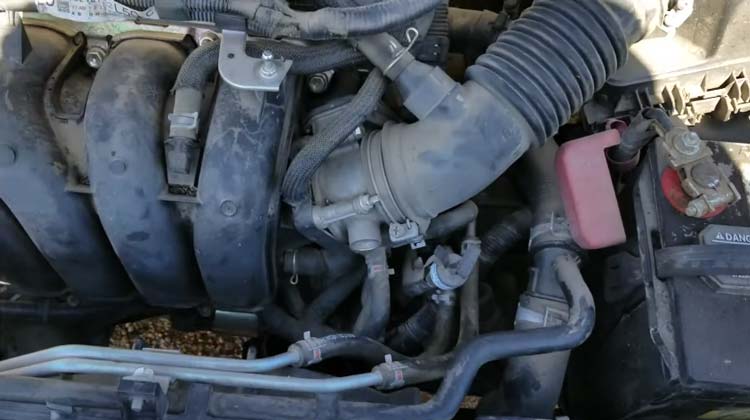
If you notice that your car has more trouble starting when it’s cold outside, it may be because the battery is having difficulty supplying enough power. When you’re shopping for a new battery, you’ll see two different amperage ratings. The first is the cranking amps, and the second is the cold cranking amperage (CCA).
The battery has no issues supplying the cranking amperage when it’s warm out, but as soon as temperatures drop, that’s when problems start. The CCA rating refers to how many amps the battery can provide to the car starter for 30 seconds at 0°F in other words, its cold-cranking ability. So naturally, the CCA rating will always be lower than what is typically needed for starting a car.
Even though most cars are made to start with the battery’s listed Cold Cranking Amps, issues can occur as the battery ages. The CCA starts dropping as the battery deteriorates. You likely won’t notice this problem in during hotter months because extra power isn’t necessary then.
You don’t want to be caught in the cold with a car that won’t start, so before winter arrives, check your battery’s health. This way, you will have time to fix any issues and avoid being stranded.
Fixing Car Hesitates To Start Issue:
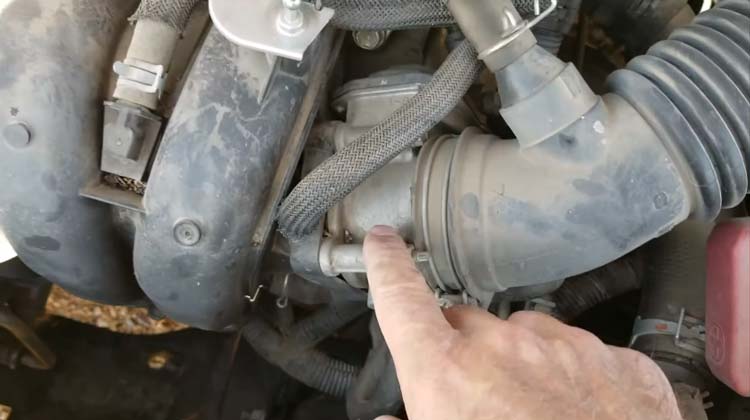
There are a few things you can do to try and fix the problem yourself.
- First, check the battery and make sure it’s fully charged. If it’s not, charge it up or replace it with a new one.
- Another thing you can try is starting the car in “neutral.” This bypasses the starter safety switch, which can sometimes get stuck in the “off” position.
- If neither of those things works, then it’s time to take the car to a mechanic and have them take a look. They’ll be able to diagnose the problem and let you know what needs to be done to fix it.
FAQs:
Q: Does a bad starter cause the car to hesitate when starting?
A: Yes, a bad starter can definitely cause the car to hesitate when starting. If the starter is failing, it won’t be able to properly engage the engine, which will make it difficult to start the car.
Q: What other symptoms might a failing alternator have?
A: In addition to the car hesitating to start, a failing alternator can also cause the battery light to come on, the headlights to dim, and the engine to stall.
Q: How can I tell if my battery is bad?
A: There are a few ways to tell if your battery is bad. One is to simply look at it–if the battery case is swollen or the terminals are corroded, then it’s probably time for a new one. Another way to tell is by testing the voltage with a multimeter. If it’s below 12 volts, then the battery is most likely bad.
Q: What should I do if my car hesitates to start?
A: If you think it might be a battery issue, try charging the battery or replacing it with a new one. You can also try starting the car in “neutral” to bypass the starter safety switch. If neither of those things works, then take the car to a mechanic and have them take a look.
Q: Why does my car have more trouble starting in cold weather?
A: Cold weather can cause battery issues because the battery has to work harder to supply enough power. When shopping for a new battery, look for one with a high cold cranking amperage (CCA) rating. This will give you an idea of how well the battery will perform in cold weather.
Conclusion:
If your car hesitates to start, there could be a few different reasons why. First, check the battery and make sure it’s fully charged. If it’s not, charge it up or replace it with a new one. Another thing you can try is starting the car in “neutral.” This bypasses the starter safety switch, which can sometimes get stuck in the “off” position. If neither of those things works, then it’s time to take the car to a mechanic and have them take a look. They’ll be able to diagnose the problem and let you know what needs to be done to fix it.
I hope that this discussion has helped you to better understand the potential causes and solutions for a car that hesitates to start. If you have any further questions about – Cause of a Car Hesitates To Start & How To Fix It, please don’t hesitate to reach out. I am always happy to help you!
